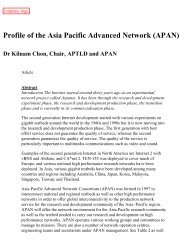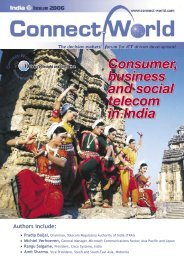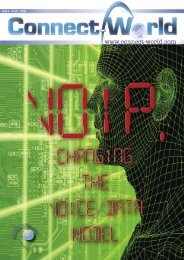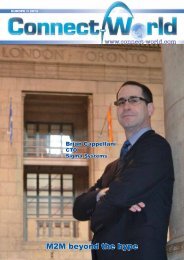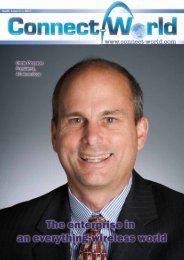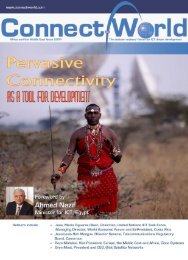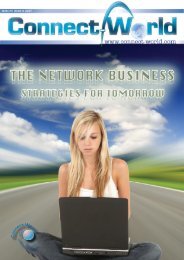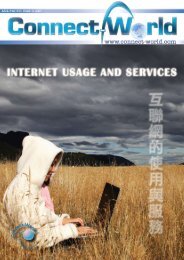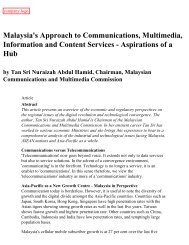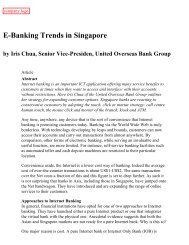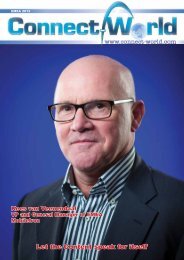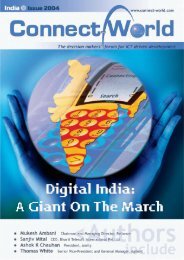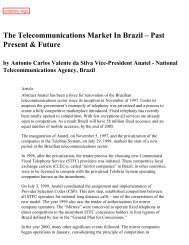Contents - Connect-World
Contents - Connect-World
Contents - Connect-World
Create successful ePaper yourself
Turn your PDF publications into a flip-book with our unique Google optimized e-Paper software.
National Development<br />
Implementing policy to bridge Koreas digital divide<br />
by Dr Yeon-Gi Son, President/CEO, Korea Agency for Digital Opportunity & Promotion<br />
Korea is an information society leader; it has the highest broadband Internet penetration<br />
in the world. The Korean Government has developed a stream of policies over the years<br />
aimed at reducing the digital divide and promoting the digital inclusion of Korean society<br />
as a whole—young and old, handicapped, city dwellers or rural inhabitants. The government<br />
provides all these with subsidised or free equipment and Internet access. Now<br />
its focus is shifting towards promoting the more effective use of IT.<br />
Dr Yeon-Gi Son is the President and CEO of the Korean Agency for Digital Opportunity and Promotion<br />
(KADO), Korea. KADO is a public organisation charged with bridging the digital divide, ensuring free<br />
access to information and communications throughout Korean society. Before joining KADO, Dr Son<br />
was President and CEO of the Information Culture Centre of Korea. At present, Dr Son is a member of<br />
the Korean National Commission for UNESCO and of the Advisory Committee for Policy of the Ministry<br />
of Government Administration and Home Affairs. Dr Son was awarded the Presidential Award in 2000<br />
and the order of Cambodian National Merit in 2003. Dr Son earned a PhD and Masters in Sociology<br />
from Texas A&M University, a Bachelor of Science from Utah State University and a Bachelor of Arts<br />
from Korea University, Seoul.<br />
Society and the digital divide<br />
Korea holds track records to prove its<br />
status as an information society. In<br />
2003, Koreas IT industry generated<br />
15.6 per cent of the countrys GDP,<br />
while IT exports accounted for 30 per<br />
cent of total exports. Korea is the<br />
world’s most wired society. It has the<br />
highest broadband penetration rate in<br />
the world.<br />
As of June 2004, there were 11.61 million<br />
subscribers to broadband<br />
Internet access. Internet adoption<br />
rates surged from 1.9 million in 1997<br />
to 29 million in end 2003—65 per cent<br />
of the population. Korea established a<br />
one-stop e-government online service<br />
centre at www.egov.go.kr, which provides<br />
guides for 4,000 categories of<br />
civil services and 393 categories of<br />
civil requests.<br />
E-government services handle such<br />
matters as resident certificates, real<br />
estate, automobiles, tax and corporate<br />
document matters — or about 70 per<br />
cent of all of the governments civil<br />
services. Korean e-commerce surged<br />
from 50 billion won in 1998 to 177 trillion<br />
won in 2002 [symbol — KRW;<br />
US$1 equals approximately1065<br />
KRW]; this corresponds to 12 per cent<br />
of the countrys total transactions.<br />
Despite the progress, however, Korea<br />
is challenged by its digital divide. The<br />
divide threatens to reduce the return<br />
on the nation’s investment in information<br />
and to undermine its social unity<br />
as well, becoming a burden on society.<br />
In the information society, ’knowledge’<br />
and ’information’ are resources<br />
that generate wealth and are instrumental<br />
in every social activity.<br />
Accordingly, the governments policy<br />
emphasises efforts to bridge the<br />
divide.<br />
Almost 35 per cent of Koreas population,<br />
about 13 million people, remains<br />
out of the information loop. A significant<br />
part of this group consists of the<br />
handicapped, senior citizens, residents<br />
living in agrarian and fishery villages<br />
and low-income people.<br />
Meanwhile, Korea will soon have 30<br />
million of Internet users and is in the<br />
process of moving from the ’Internet<br />
1-Generation’ to the ’Internet 2-<br />
Generation’. In the Internet 1-<br />
Generation, the major issue was the<br />
’Internet literacy’, so the policy focus<br />
was upon educating people to access<br />
the Internet. In the Internet 2-<br />
Generation, its key issue is usually<br />
how people can make the most of the<br />
Internet in their daily lives.<br />
Accordingly, an important national<br />
task for the government is to reduce<br />
the gap, among the 65 per cent of<br />
Koreas population that uses the<br />
Internet, between those who use the<br />
computer and the Internet productively<br />
and those who simply use it as<br />
consumers.<br />
Concerning the digital divide<br />
As the general level of access to and<br />
use of information increases, there is a<br />
trend towards further widening the<br />
digital divide. The profession or gen-<br />
19



